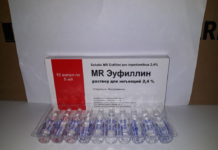Women who have a baby often experience stomach problems. Using Almagel during pregnancy helps to safely get rid of discomfort. This drug is suitable for use at any time, which makes it an indispensable tool for expectant mothers.
Material Content:
- 1 Is it possible to take Almagel in 1, 2, 3 trimesters
- 2 Types and composition of the drug
- 3 In what cases is an antacid prescribed
- 4 Instructions for use at different stages of pregnancy
- 5 The effect of Almagel on the fetus
- 6 Drug interaction
- 7 Contraindications, side effects and overdose
- 8 How to replace the drug
Is it possible to take Almagel in 1, 2, 3 trimesters
Gastrointestinal problems can be troubling at any time during pregnancy. In the early stages, flatulence is more often worried. This is due to the general restructuring of the body. The rest of the time a child is born, constipation often occurs. This condition is caused by inhibition of intestinal motility and restriction of its motility by the fetus. Almagel is approved for use in any trimester, but the course of therapy should be no longer than 3 days.
Types and composition of the drug
The classic Almagel form is available as a whitish-gray suspension. It has a lemon smell and a sweet taste. 5 ml of liquid contains 200 mg of aluminum in the form of oxide and 100 mg of magnesium hydroxide. The packaging of thin cardboard contains a plastic bottle with a volume of 170 ml and a measuring spoon. The medicine has enveloping, adsorbing and antacid effects. It reduces the effect of pepsin, alkalizes the hydrochloric acid of the stomach and its juice, and also prevents damage to the mucous membrane of the digestive system.
Almagel Neo is considered a combined drug and has 36 mg of simethicone, which has a carminative effect.It contains 340 mg of aluminum hydroxide and 395 mg of magnesium hydroxide. The suspension has an orange smell and white color. The release form exists both in bags with an individual dose (10 pcs. In 10 ml), and in bottles of 170 ml.
Almagel A in 5 ml of the drug contains 109 mg of benzocaine, 2.18 algeldrat and 350 mg of magnesium hydroxide. The drug is produced in the form of a suspension, which has the smell of lemon and a white tint. In a package of thin cardboard are a bottle with a volume of 170 ml and a spoon for dosing. Benzocaine helps to relieve abdominal pain in some pathologies of the gastrointestinal tract, and algedrate neutralizes the laxative effect of magnesium hydroxide, preventing the development of diarrhea during treatment.
The medicine does not have a systemic effect, as it acts locally and is not absorbed from the digestive tract. The action of the drug is noted after 3-5 minutes from the time of administration. The total drug exposure time is 70 minutes.
In what cases is an antacid prescribed
Almagel refers to antacids with additional effects due to the active components. Therefore, the drug has a list of indications:
- inflammation of the stomach and small intestine;
- side effects during treatment with glucocorticosteroids and similar drugs;
- esophagitis and gastroesophagic reflux;
- chronic course of inflammation of the stomach of unspecified etiology;
- diaphragmatic hernia, uncomplicated by bowel obstruction or gangrene;
- side effects after treatment with analgesics, drugs for non-steroidal inflammation, antipyretic drugs;
- peptic ulcer of the wall of the stomach or duodenum;
- colitis and gastroenteritis of non-infectious origin;
- malnutrition and lifestyle;
- flatulence (Almagel Neo);
- epigastric pain (Almagel A).
In the presence of one of the conditions, one of the types of Almagel can be prescribed to the patient. But before use, it is worth clarifying contraindications. And with complex treatment, the compatibility of all the drugs used is checked.
Instructions for use at different stages of pregnancy
If the patient is concerned about epigastric pain, nausea and vomiting, therapy begins with Almagel A. This condition is characteristic of the first trimester of pregnancy. When the unpleasant symptoms recede, the woman is transferred to the classic type of drug. The dosage and dosage regimen does not change.
If the patient has severe flatulence, Almagel Neo is prescribed. It helps to cope with increased gas production due to simethicone in the composition. The medicine is safe to use at any time.
Important! The treatment regimen for pregnant women does not involve the use of the drug for longer than 3 days.
In the second half of pregnancy, Almagel for heartburn is most often used. The medicine is administered orally, 30 minutes before a meal. If the patient has a history of peptic ulcer of the duodenum or stomach, Almagel should be drunk in between meals. The recommended dosage is within 1-3 measured spoons. To use the drug is 3-4 times a day. Treatment begins with the least amount of funds, but if necessary, increase it to the upper limit of the norm.
The effect of Almagel on the fetus
Active substances in the composition of the drug are not absorbed into the blood. They do not have a systemic effect, so they have no effect on the fetus. This allows the use of the drug at any stage of pregnancy.
Drug interaction
Despite the lack of a systemic effect, the drug can interact with other drugs. This is due to the peculiarity of its effect on the digestive tract.
Almagel reduces the activity of certain compounds:
- phenothiazines;
- tetracyclines, ciprofloxacin;
- digitalis glycosides;
- ketoconazole;
- antihistamines;
- isoniazid;
- beta adrenolytics;
- cardiac glycosides;
- indomethacin;
- salts of iron.
If there is a need for complex therapy, the interval between the means should be at least 1-2 hours. In this case, their dose adjustment can be omitted. The patient needs to carefully monitor his condition, and when it changes, report it to the attending physician.
Contraindications, side effects and overdose
The drug is a fairly safe medication, but may not be used in all cases. Its use is not allowed during lactation, in newborns, with serious pathologies of the kidneys, an allergy to one of the components, or the presence of Alzheimer's disease. In these cases, the Almagel is replaced by a similar remedy that is allowed in this situation.
In some cases, side effects may develop. These include:
- pathological fatigue;
- constipation
- peripheral edema;
- taste pathologies;
- osteomalacia
- bouts of nausea;
- the accumulation of a large amount of calcium or magnesium in the blood;
- dementia
- gagging;
- insufficient concentration of phosphorus in the blood;
- digestive organs spasms;
- pain in the abdomen.
If you find unpleasant symptoms, you should consult a doctor. If you exceed the dosage of the drug, it is possible to weaken the digestive system. This is regulated by the use of laxatives.
How to replace the drug
If there are contraindications or an individual reaction to the drug, the patient needs to choose an analogue. According to the effect on Almagel are similar:
- Palmgel A - is made in the form of bottles with gel for oral use in 150, 200 and 250 ml, it has anesthetic, enveloping, adsorbing, antiulcer, choleretic and antacid effects due to the action of benzocaine, aluminum and magnesium hydroxides, methyl cellulose;
- Rennie - comes in the form of chewable tablets, each of which contains magnesium hydroxycarbonate and calcium carbonate, which have an antacid effect;
- Gastal - is made in the form of absorbable tablets that contain magnesium hydroxide and magnesium carbonate, as well as aluminum hydroxide, helping to neutralize hydrochloric acid and establish digestion;
- Phosphalugel - is available in the form of a gel with an orange taste and smell in a volume of 16 or 20 g. Contains 20% aluminum phosphate as an active component, which provides enveloping, absorbent and antacid effects.
Almagel has no absolute analogue in composition. Therefore, it is better to use the original drug prescribed by a doctor. This will provide the highest level of safety and effectiveness while observing the rules of administration and dosage.
Various forms of Almagel help to choose the optimal effect of the drug used. This makes him a universal assistant to expectant mothers. And the absence of influence on the fetus guarantees peace and safety in the treatment of pregnant women at any time.

















